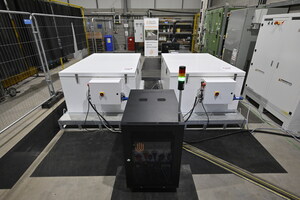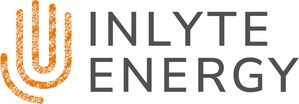
SAN LEANDRO, Calif., Oct. 26, 2023 /PRNewswire/ -- Today Inlyte Energy announced its $8 million seed funding to be used to develop the first generation of its grid batteries made with the most abundant materials – iron and table salt. Inlyte's solution leverages the proven design of the previously-commercialized sodium metal halide battery to create an energy storage system with high efficiency, long lifetime, competitive energy density, excellent safety, and at an ultra-low cost.
Although solar and wind are now more economical energy sources than fossil fuels, the challenge of affordable energy storage remains a hurdle. An electrical grid powered by intermittent renewables like wind and solar requires massive investments in energy storage technologies. Near-term forecasts for the grid storage market show exponential growth, driven in large part by the economics of wind and solar, with some estimates at a 35% CAGR by 2030.
Inlyte Energy's solution has several benefits over lithium-ion, sodium-ion, and other battery chemistries. Because the raw materials are common and inexpensive, Inlyte's batteries will have the lowest cost once manufacturing is scaled; iron and salt are also locally produced in almost all parts of the world and avoid foreign-controlled supply chains. With a completely selective solid ceramic membrane and no flammable organic compounds, the iron and salt battery has a very long lifetime, while providing the same round-trip efficiency and similar footprint as lithium-ion.
Inlyte's round is led by At One Ventures with participation from First Spark Ventures, Valo Ventures, TechEnergy Ventures, Climate Capital, Anglo American, and others. The company was incubated at Activate in partnership with Lawrence Berkeley National Lab and received an ARPA-E award in 2022 for its battery development. The company was also recently named to the 2023 Cleantech 50 to Watch.
"Conventional sodium metal halide batteries, made from nickel and salt, were developed for electric vehicles in the 1980s and '90s but never made it down the cost curve," says Founder & CEO, Dr. Antonio Baclig. "At Stanford, I realized that by optimizing that design for the grid instead of for vehicles, and by using iron instead of nickel, we could drive the cost incredibly low. Inexpensive storage is what will truly make wind and solar a competitive total solution versus fossil fuels, not just in California but everywhere in the world."
"At the end of the day, solutions for the climate crisis are beholden to economics for both companies and countries, and we would have chosen this design and these materials on that basis alone – but there are so many other benefits as well."
Iron and salt batteries, unlike lithium-ion batteries, can also operate in extreme heat or cold, making them well suited for locations with increasingly high temperatures. Inlyte is targeting the diurnal energy storage market, with a storage duration of 4-10 hours, for which its batteries will provide excellent round-trip efficiency (how much energy is kept in a charge-discharge cycle) appropriate for grid storage and other industrial applications.
In November of 2022, Inlyte Energy acquired Beta Research Ltd., composed of the core team of scientists in the UK who originally developed a sodium metal halide battery 40 years ago and brought the technology to commercial readiness and manufacturing capacity on multiple continents. Beta Research's fully-functioning pilot production line, with 30,000 square feet of manufacturing and testing facilities, allows Inlyte to immediately go-to-market with pilot projects once the optimized design is complete.
"The experience of the Beta Research team and their facilities give Inlyte a significant advantage compared to other battery startups in this space. They don't need to find a pilot factory, get the tooling, or figure out how to manufacture," says Laurie Menoud, Founding Partner at At One Ventures. "Inlyte's ability to compete with lithium-ion on lifetime, round-trip efficiency, and of course upfront cost also gives them a significant opportunity in a market that's exploding right now."
Inlyte's iron and salt batteries also have another significant advantage over other batteries: they are incredibly safe, with no risk of fire.
Inlyte is finalizing its grid-optimized, next-generation sodium metal halide design and is planning to engage with pilot customers in the coming months, with the ultimate goal to launch a full factory in the United States in the coming years to leverage incentives from the Inflation Reduction Act.
About Inlyte Energy
An electrical grid powered by climate-friendly, intermittent renewables requires a massive increase in energy storage. Inlyte Energy's grid battery leverages the proven design of the sodium metal halide battery to create an energy storage solution with the unique combination of high efficiency, long lifetime, competitive energy density, and exceptional safety, using the most abundant commodities - iron and salt. Inlyte was incubated at Activate and is backed by At One Ventures, First Spark Ventures, Valo Ventures, TechEnergy Ventures, and more.
About At One Ventures
At One Ventures invests in deep-tech startups catalyzing a world where humanity is a net positive to nature. The firm is highly technical and was founded by Tom Chi, former Head of Experience and founding member at Google X. At One Ventures finds, funds, and grows companies that are using disruptive deep tech to upend the unit economics of established industries while dramatically reducing their planetary footprint. To date, At One Ventures has invested in 35 startups, including battery recycler Ascend Elements, de-extinction company Colossal Biosciences, and biodegradable packaging supplier Cruz Foam. For more information, please visit https://www.atoneventures.com.
SOURCE Inlyte Energy, Inc.








Share this article